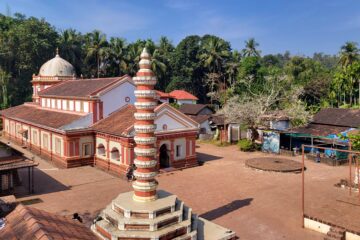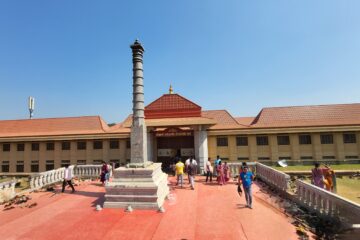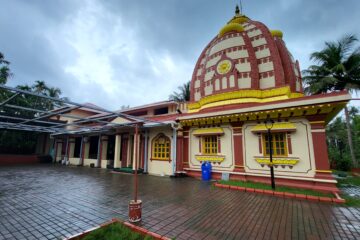Betki’s Sacred Secret: A Temple with a Curious Name
On our way back after visiting the Anant Devasthan, we came across a signboard at Betki that read “Mandodari Temple.” The board also mentioned that it was the only temple dedicated to Mandodari. Noticing the name spelled as “Mandodari(मंडोदरी )” instead of the correct “Mandodari (मंदोदरी)” in Devanagari script, we started discussing how such an error might have occurred? Curious, we took the left turn to check out the temple. As we passed through narrow roads lined with coconut and areca nut groves, we reached the temple, located roughly 200 meters away.
Mandodari: The water Goddess of Betki
The temple appeared quite old and had a distinct charm. Upon entering through the main gate, we saw the temple of Lakshmi Ravalnath on the right and the hall of the Mandodari Temple on the left. The main Mandodari temple itself is small yet captivating.
Climbing the temple steps, we entered a passage that led to a spacious central hall (chowk). From there, we had a serene darshan (view) of Goddess Mandodari in the sanctum. The idol, made of black stone, is a four-armed representation of the goddess.
Despite the darshan, a question lingered in my mind—why was the name “Mandodari(मंडोदरी)” written everywhere instead of “Mandodari (मंदोदरी)”? I voiced this curiosity to a temple official, who clarified that this Mandodari is not Ravana’s wife but a water goddess. The name “Mandodari” is derived from “Mand” (water) and “Udar” (stomach), symbolizing one born of water. This belief is deeply rooted in the devotion of her followers. The temple official then shared the goddess’s legend, which goes as follows:
The Sacrifice Behind the Lake: A Tale of Mandodari and Narbando
The village of Betki, blessed with lush greenery, was once home to numerous springs. During the monsoons, the water from these springs would go to waste. To utilize this water for farming and fruit cultivation, and to ensure a year-round water supply, the villagers decided to construct a large reservoir. However, despite their efforts, they struggled to succeed. Frustrated, the villagers sought divine intervention, and the goddess decreed that the project would only succeed with the sacrifice of two siblings.
Nearby, a widow lived with her two children—her daughter Mandodari and son Narbando—close to the site of the reservoir construction. The villagers decided to sacrifice these siblings. While the brother went to pluck a lotus from the water, he was pulled in, and his sister Mandodari, attempting to rescue him, also drowned. Thus, the water claimed both siblings as a sacrifice. Following this, the reservoir construction succeeded, creating the state’s largest man-made lake, famously known as Mandodari Talav (Mandodari’s Lake).
However, the story took a grim turn. Devastated by her children’s death, the grieving mother cursed the village, proclaiming, “For the next 24 years, no rice will grow here.” Despite the reservoir, the curse rendered it useless, forcing the villagers to abandon Betki.
Around the same time, a community from the Fadte clan of Verna, fleeing Portuguese persecution, settled in Betki. Learning of the curse, they sought the grieving mother to plead for forgiveness. However, by then, the widow had left the village. After much searching, they found her and begged for the curse to be lifted. Relenting, she modified the curse, saying, “Instead of 24 years of no rice growth, rice will not cook in the village for 24 hours.”
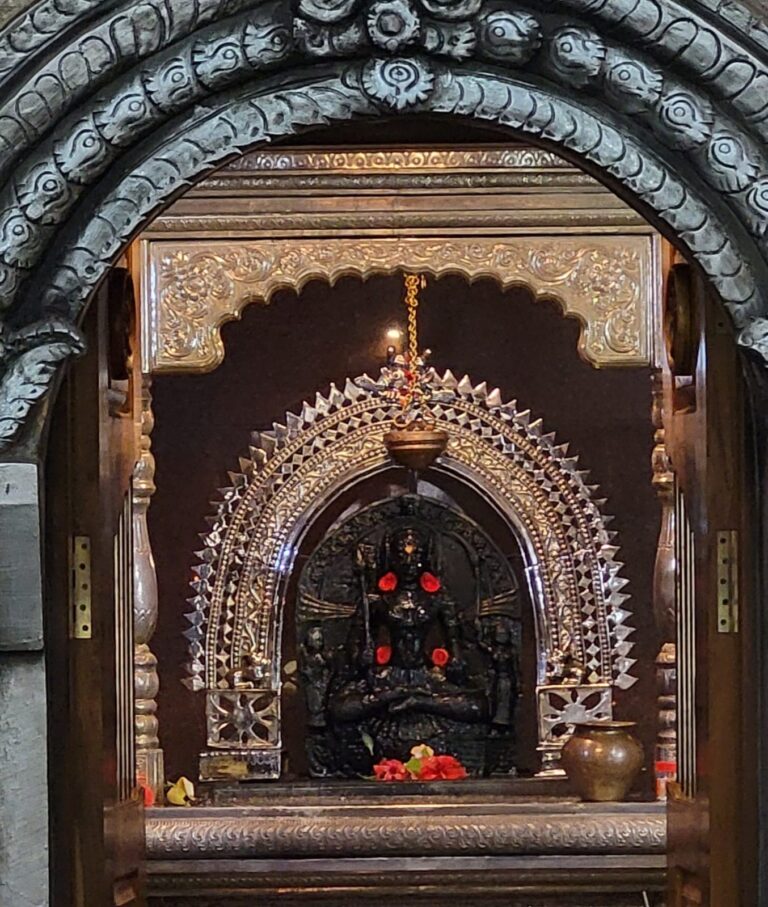
The Temple Today
In memory of Mandodari and Narbando, the villagers built a temple near the reservoir. Later, the idol of Goddess Mandodari was relocated to its current temple. The villagers firmly believe that Mandodari is the mother of the reservoir.
To this day, Betki observes a day each year when no food is cooked, and only snacks are consumed. This day is decided through divine counsel. On Maha Shivratri, the temple holds a grand procession and special worship of Goddess Mandodari. The main festival, Kala Utsav, is celebrated on Margashirsha Sankashti Chaturthi.
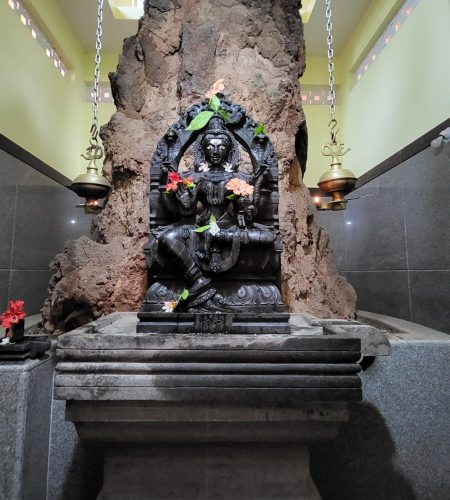
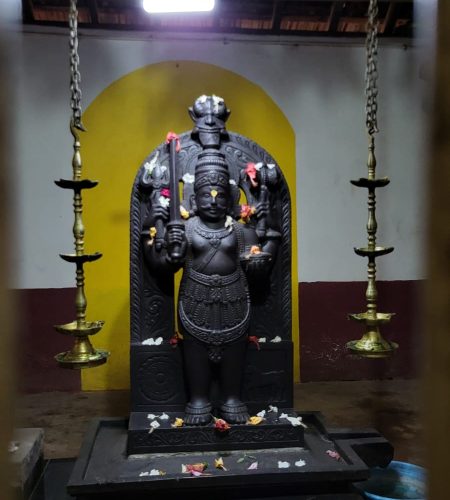
Other Temples in Betki
Betki village, surrounded by lush coconut and areca nut plantations, is home to other noteworthy temples. Adjacent to the Main Temple is the temple of Sateri Devi, featuring a beautifully carved idol with a large anthill in the background. Nearby is the temple of Grampurush (village deity), whose idol is equally exquisite.
A Serendipitous Visit
This unplanned visit to the serene Mandodari Temple and the picturesque village of Betki turned out to be a delightful and memorable experience.
